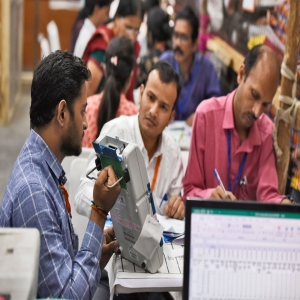
.png) Joseph Maliakan
Joseph Maliakan
.jpg)
The haste with which the Election Commission of India (ECI) announced on Monday, October 27, the Special Intensive Revision (SIR) of voters' lists in 12 States and Union Territories has aroused grave suspicion about the real intention behind the move.
Is the Commission, on the pretext of revision of the voters list attempting to make a National Register of Citizens or is it trying to remove the marginalised sections of the population from the electoral roll, like the minorities, especially the Muslims and the Dalits and the backward classes who are known for opposing the National Democratic Alliance (NDA) led by the Bharatiya Janata Party (BJP).
The ECI announced a nationwide SIR through a circular issued on June 24, 2025. The first phase of SIR, as stated in the circular, would be held in Bihar ahead of the November 2025 assembly election.
Soon, several writ petitions were filed in the Supreme Court by individuals and political parties, challenging the SIR as unconstitutional because it violates the provisions of the Representation of the People Act, 1950.
The Bihar SIR, the petitioners argued, is illegal because it ignored the electoral roll revisions undertaken by the ECI up to January 2025 and went back to the 2003 electoral roll as the basis for revision. In the SIR, the Commission asked all those voters who were not listed in the 2003 electoral roll to apply for a fresh registration with one or more of the 11 documents identified by ECI as proof of citizenship.
The ECI excluded the voters' ID issued by the Commission and the Aadhar card as proof of citizenship for inclusion in the voters' list. Following the Supreme Court's intervention, the Commission reluctantly agreed to accept the Aadhaar card for inclusion in the voters' list.
The Representation of the People Act, 1950, states that inclusion in the voters' list will be done based on a self-declaration of citizenship, backed by one of the six documents listed in Form 6 of the 1950 Rules: birth certificate, matriculation certificate, passport, Aadhaar card, PAN card, and driving license.
The 11 documents now being demanded by the Commission to prove one's citizenship ironically exclude the Aadhaar card, the PAN card, and the driving license. The Commission has arbitrarily amended the Rules of the Representation of the People Act, 1950, a prerogative reserved for Parliament alone. Do the Election Commissioners think that they are above the law?
Furthermore, the Supreme Court, in its 1995 judgement in the Lal Babu Hussein case, held that once a person has been registered in the voters' list, their name cannot be removed except by holding an enquiry into the voter's citizenship and after providing an opportunity to be heard.
Therefore, the SIR is being carried out in clear violation of the Supreme Court order, as it ignores the Commission's own revisions since 2003. In other words, the Commission is not only scrutinising all voters with suspicion but is also questioning the authenticity of its own work.
The October 27 announcement by the Commission for SIR has come even as the Supreme Court is hearing a challenge to the Commission's actions. The second phase of the SIR is scheduled to be held in 12 States and union territories, including West Bengal and Tamil Nadu, both of which will hold elections in 2026, and Uttar Pradesh, which will hold elections in 2027.
The electoral rolls in Andaman and Nicobar Islands, Chhattisgarh, Goa, Gujarat, Kerala, Lakshadweep, Madhya Pradesh, Puducherry, and Rajasthan will also be revised in this phase. Since Citizenship rules in Assam differ from the rest of the country, voter list revision in the state will be held at a later date.
In the second phase, the enumeration will take place from November 4 to December 4. Draft rolls will be released on December 9. Voters removed from the rolls can appeal up to January 8, 2026. The final revised rolls will be published by February 7, 2026.
The SIR, upon close examination, is not just a revision of the voters' list. It is being carried out in clear violation of the provisions of the Representation of the People Act, 1950, and its rules. Through demanding fresh documents to prove one's citizenship, the ECI has usurped the powers of the Ministry of Home Affairs, Government of India.
Between 1947 and 1950, when India did not have any citizenship laws, the country prepared its first electoral roll. It was established based on trust in the people of the country. But today, things have turned upside down; the ECI is approaching people with suspicion.
The onus of proving citizenship has been transferred to the individual, most of whom do not possess the documents demanded by the Commission. Ordinary citizens in the country only have a ration card or an Aadhaar card, which the Commission refuses to accept as proof of citizenship.
The first voter list was based on natural membership or default belonging, rather than proven citizenship, because the majority of Indians at the time, and even now, do not possess any proof of citizenship. The burden of proof for citizenship lies with the individual, not with the powerful state or its agencies.
The mandate of the Commission is to conduct free and fair elections, not to determine anyone's citizenship! It is a blatant violation of the Constitution by the ECI. The umpire has become the gatekeeper!